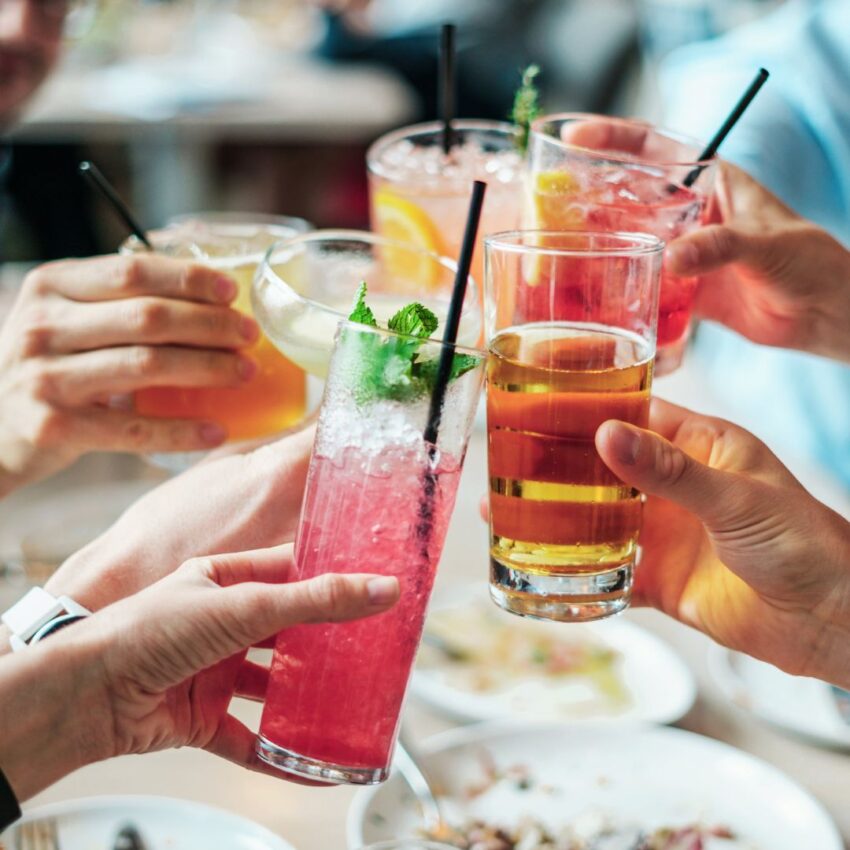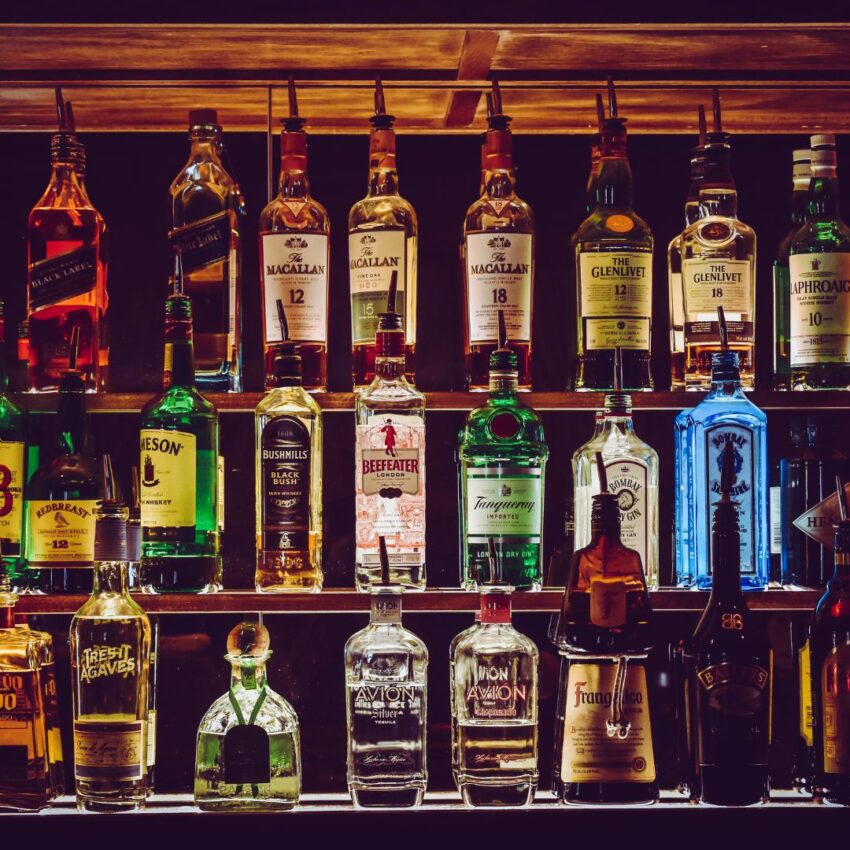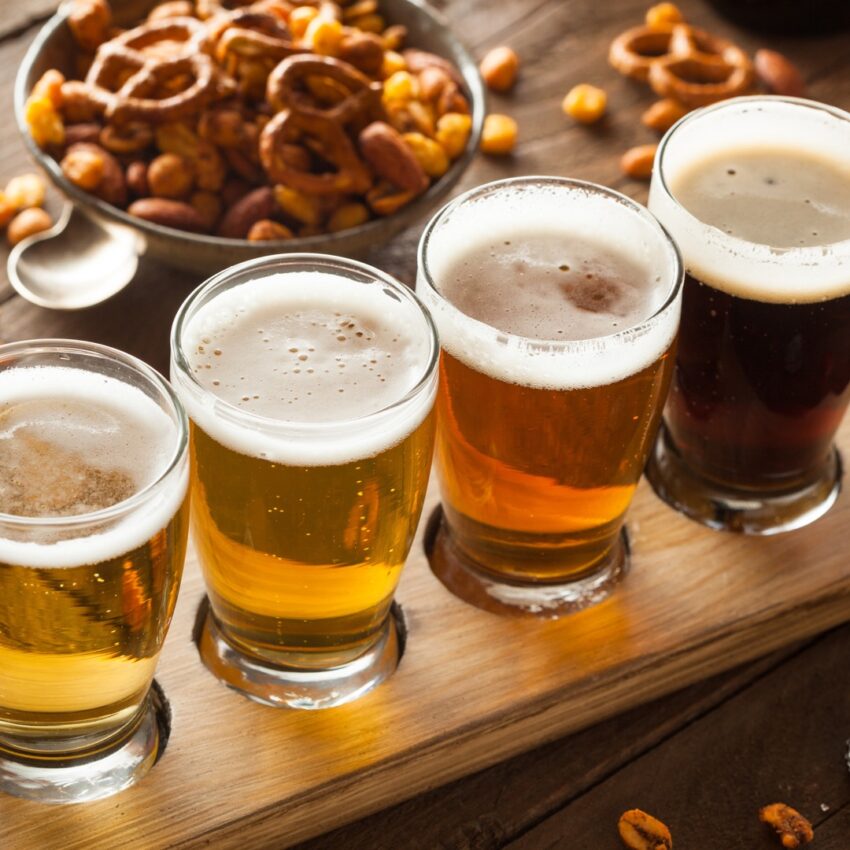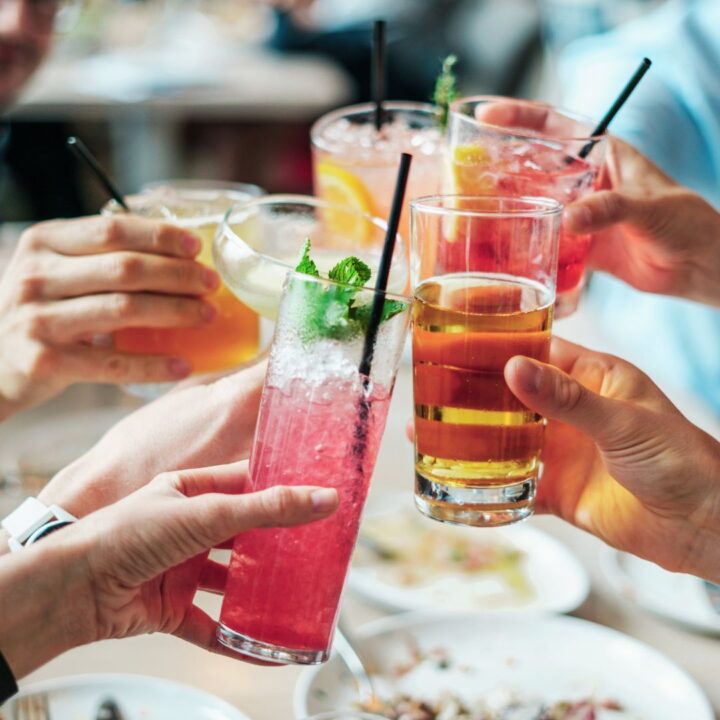Alcohol can be part of a low carb or keto diet. It helps to have an understanding of how alcohol is metabolized in these diets, however (i.e., you often will feel it quicker). It also helps to understand where the relative carbs are with various spirits and wines. For the most part, if you avoid sugary mixers and flavored spirits, you should be able to socialize and enjoy low carb alcoholic drinks on a low carb or slow carb lifestyle.

Jump to: How Alcohol Acts in the Body | Carbs in Distilled Spirits | Carbs in Beer | Carbs in Wine | Which Drinks Have Least Carbs?
This post may contain affiliate links. As an Amazon Associate, I also earn from qualifying purchases. You can read our disclosure information here–
How Alcohol Acts in the Body
Although alcohol is often lumped into the carbohydrate category, it acts differently in the body. For one thing, when there is alcohol in the body, its calories are used first for energy, before carbohydrate or fat.
These calories are sometimes referred to as “empty”, and even a single serving of clear spirits will have around 100 of them. If you’re on a low carb diet for weight loss reasons, remember that although some drinks have zero carbs, they can still affect your results.
It can also have some unpredictable effects on blood sugar. This is because when alcohol is present, the liver goes to work on it immediately, breaking it down into carbon dioxide and water. The liver’s job is to get rid of toxins in the body, and alcohol is like a poison in that way.
While the liver is working on breaking down the alcohol, it isn’t doing its other jobs as well, including regulating the amount of glucose in the blood. So blood glucose can, in fact, drop a bit.
To minimize this, don’t drink on an empty stomach, and limit alcohol on a low carb diet to two drinks per day for a man, or one drink for a woman. (A drink is 12-ounce beer, 4-ounce wine, or a jigger of distilled alcohol.)
The late physician Alex Paton, who was a gastroenterologist and expert on alcohol misuse, stated:
Food, and particularly carbohydrate, retards absorption: blood concentrations may not reach a quarter of those achieved on an empty stomach.
–Alex Paton
It’s not surprising, then, that you need to take it easy if you’re on a low carb diet!
Remember that you may also hit the legal driving limit quicker, so it’s best to leave the car at home even if you’re only having one or two drinks tonight.
Amount of Carbs in Different Forms of Alcohol
Carbs in Non-flavored Distilled Spirits

Unflavored spirits like whiskey, vodka, brandy and gin don’t have any carbs. As long as you don’t combine them with any sugary mixers, you can rest assured that your drink is carb-free.
If you do want a mixed drink, there are some ways to keep it really light on the carbohydrates. This can be difficult if you’re ordering at a bar, but if you’re mixing up some cocktails at home, you’ve got options.
First off, I particularly like using drink syrups instead of sugar-laden sodas, as they’re not nearly as heavy on the carbs and you can more easily monitor how much sugar you’re putting in your drink.
Other easy carb-cutting options include using carb-free sweeteners rather than sugar or a little simple syrup with diet soda as a mixer.
Check out a few of my favorites:
- Here are some great craft cocktails compliant with a low carb diet.
- Skinny Moscow Mules
- Blackberry Mojitos
BEER

There is some confusion about maltose in beer because of things written in some low-carb diet books. Although the malted barley used to make beer produces maltose, a sugar that has a glycemic index higher than glucose, the fermentation process uses up all the maltose in the beer while it is being brewed.
The USDA database shows that there is no maltose in beer. However, there is carbohydrate in beer that should be counted as you would count any other carb.
The amount varies depending upon the brand of beer. Regular beer averages about 12 grams of carbohydrate per 12 oz can or serving. Sorry beer drinkers!
Light beer isn’t necessarily low-carb beer either, nor is alcohol-free beer – some light beer has almost as much carbohydrate as regular beer. Most, though, is in the range of 3 to 7 grams of carbohydrate per serving. It’s best to just read each label when deciding.
Ale generally has somewhat less carbohydrate than regular beer (5-9 grams per serving), whereas stout is the worst kind of beer you can drink on a low-carb diet –- it has around 20 grams of carb per 12-oz serving.
WINE

Basically a 3.5 oz glass of wine, red or white, has around 91 g of water, 9.6 g of alcohol, 73 calories and 1.2 g of “carbohydrates by difference”.
There aren’t actually ANY carbohydrates in wine, but that ‘leftover’ amount is the glycerine in the wine that sort of acts like a carbohydrate. It just doesn’t raise the blood sugar.
Wines have very few carbs in them at all, or at least the dry ones don’t, and the calories in wine come from the alcohol. The end result is that the wine which is higher in alcohol is the one that will be higher in “carb equivalents”.
So you could say that a wine with 14% alcohol gives you 2 carbs and a wine of maybe 10% gives you 1 carb. The net result is that a glass of wine gives you “under 2g of “carb-like substances”.
The Atkins diet has reversed their recommendations on no wine, and it might not be long before they fully endorse wine drinking as a non-carb-counting activity, because of how it raises your HDL and lowers your blood sugar levels.
Frequently asked questions
If you want a low or no carb drink, consider some pure spirits, though maybe make it on the rocks so it doesn’t knock you off your feet. Maybe a dry martini or just a nice whiskey. My favorite spirit these days is tequila or mezcal. Check out this tequila flight for something fun to do with friends.
Unless you swap simple syrup for carb-free sweeteners and/or sugary mixers for diet soda, not many, but there are a few. Have a white wine spritzer like the Germans love, go for a vodka soda with lots of lime, choose a gin rickey or revert to the classic scotch & soda. Perfect if you’re going to a bar and don’t want to bother the bartender by asking if they’ve got stevia!
Online Diet/Health Coaching:
Although I am not currently taking clients for diet & health coaching, I was a coach for many years with the online service called coach.me. It is a great platform for all kinds of coaching – anything from specific diets, writing a blog, getting up early, or getting rid of that pesky procrastination.
There are some wonderful coaches and the testimonials will tell you what you need to know. Contact me at [email protected] to get a referral to some of the tested, experienced online coaches on Coach.me.
Paton, A. (2005). Alcohol in the body. Bmj, 330(7482), 85-87.


Good to know all this. Thanks for the info.
I’ve heard that alcohol can actually increase metabolism as long as it’s not abused. This is good info!
So glad you got something from it Shawn! I like the part where you say “as long as its not abused”. That part is going to be pretty individual. As a previous bartender I saw a lot of abuse. For me, if alcohol effects my sleep quality I know to back off.
I don’t drink alcohol so problem solved for me. ???
Yes, many people don’t drink alcohol for a variety of reasons. Many people do enjoy wine with meals or cocktails at social outings so this article is more for the casual, social drinker that is curious about the relationship to fat loss.